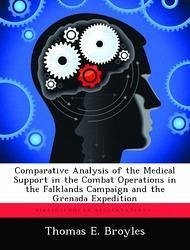This study examines the medical support of combat operations by the British in the Falklands Campaign of 1982 and by the Americans in the Grenada Expedition of 1983. Recent history portends the increased use of ground combat forces in short duration employments far from logistical bases. These two examples of rapidly deployed land forces are investigated to illustrate the principles and operational concepts of medical support shared in common by both the American and British Armies and needed to support rapidly deployed forces. Medical support by the British in the Falklands and by the Americans in Grenada is analyzed by comparing the two medical support operations with each other and against established principles and operational concepts. The medical support principles used for this comparative analysis are conformity, proximity, flexibility, mobility, continuity, and control. The medical support operational concepts used include triage, echelons of medical support, elements of combat medicine, patient evacuation, and command and control. The medical support operations in the Falklands, like those in Granada, are examined both in planning and execution as well as with respect to the role of medical command and control. Lessons learned by the respective medical departments are discussed in the light of the specific combat operation and in their particular relevance to general rapid deployment force medical support requirements. The Falklands Campaign points out the highly successful joint medical support provided by the British and the precision with which they planned their medical support operation. It also points out British problems with aeromedical evacuation. The Grenada Expedition illustrates the hazards of precluding medical participation in planning a combat operation and the severe impact on field medical support when a joint operation is poorly coordinated.
Hinweis: Dieser Artikel kann nur an eine deutsche Lieferadresse ausgeliefert werden.
Hinweis: Dieser Artikel kann nur an eine deutsche Lieferadresse ausgeliefert werden.








